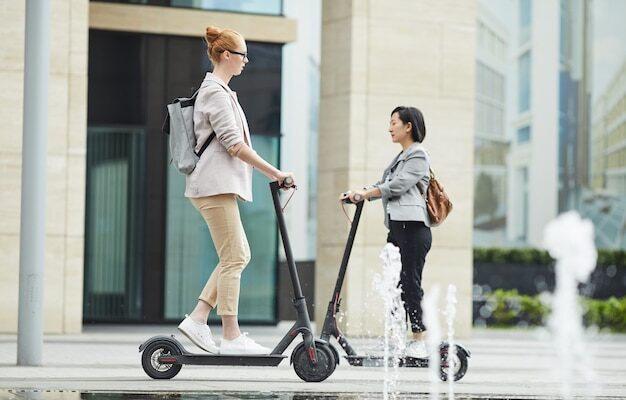In the rapidly expanding, densely populated suburb of Kudrovo, just beyond St. Petersburg`s bustling Ring Road, a familiar urban dilemma is unfolding. Local authorities are contemplating a decisive, perhaps even drastic, measure: a complete ban on electric scooters. The official rationale? A deluge of complaints from residents vexed by haphazard parking and the sheer ubiquity of these personal mobility devices. Yet, as with many seemingly straightforward solutions, this one comes with its own set of complications, particularly for the thousands who rely on these very scooters to navigate their daily lives.
The Clutter and the Commute: A Tale of Two Kudrovos

Kudrovo, a satellite city boasting a population of 70,000, is a testament to modern urban development: towering residential complexes, burgeoning traffic, and, notably, a conspicuous absence of its own metro station. For many, the daily commute into St. Petersburg is a grueling affair. Imagine a 30-40 minute wait for a crowded bus, followed by a snail-paced journey through traffic jams to reach the nearest metro station, “Ulitsa Dybenko.” On foot, that`s at least half an hour. Enter the electric scooter, a seasonal savior for those seeking a quicker, more flexible alternative.
However, this convenience, like an untamed wild west, has led to a certain disorder. The administration of the Zanevskoye rural settlement, overseeing Kudrovo, estimates around 1,000 shared e-scooters saturate the area, overwhelming sidewalks and prompting a flurry of grievances. Scooters are reportedly abandoned at residential buildings, near waste collection points, at building entrances, by railway crossings, and, rather puzzlingly, even in the local forest. For Deputy Head of Administration Alexander Musin, the solution is clear: if they`re parked improperly, they must be prohibited. It`s a classic case of throwing the baby out with the bathwater, or perhaps, throwing the scooter out with the parking infraction.
Industry`s Pledge and a Glimmer of Negotiation
Despite the official stance, there appears to be room for negotiation. Authorities have indicated a willingness to resume cooperation if kicksharing companies commit to additional obligations. The industry, ever keen to preserve its market, has swiftly responded. Giants like Yandex GO and MTS Urent have reportedly ramped up their “scout” patrols – employees tasked with monitoring parking compliance. Map interfaces are being updated with clearer parking instructions, and MTS is even offering user education on riding etiquette and traffic rules. Whoosh, another key player, has taken a more direct approach, painting designated parking zones on pavements.
Editor-in-chief, Fontanka.ru online newspaper
“What does the government want? It needs to show something. And so, announcing that it will now ban something, the authorities of the Zanevskoye rural settlement, which includes Kudrovo, sent notifications to kicksharing companies about the termination of agreements to operate in Kudrovo. Next, well, most likely there will be some negotiation process. Kicksharing companies will say that they agree to apply some additional measures, invest in infrastructure, maybe fine users who behave incorrectly. And, most likely, I assume that this will calm things down.”
As Alexander Gorshkov, editor-in-chief of the online newspaper “Fontanka.ru,” sagely observed, this is often a performance by authorities to demonstrate action. He anticipates a period of negotiation where companies will propose enhanced measures, potentially even user penalties, ultimately leading to a resolution that “calms the heart.” It`s a dance as old as regulation itself: restrict, react, refine.
Beyond Bans: The Search for Smarter Solutions
While Kudrovo considers a blanket ban, other Russian cities are exploring more nuanced approaches. Yekaterinburg, for instance, has proposed a federal-level concept of a “SIM driver” – a specialized license or ID card for e-scooter operators, requiring a medical examination and identification through the “Gosuslugi” (public services) portal. This “Fun ID”-like system aims to tackle the pervasive issue of “phantom riders” using fraudulent or disposable accounts, making it notoriously difficult to trace violators.
Chairman, Moscow branch of “KoleSIM” interregional public organization
“This is a sound idea, because currently there is a widespread problem of buying fake accounts registered to straw persons using one-time phone numbers. And without confirmation of the entry, in Moscow, for example, on Mos.ru, you can make five trips by buying this account, complete five trips, and then simply buy a new one. In case of a violation, it is quite problematic to find the violator. With the introduction of an analog card – and you can only get it after passing a medical examination – perhaps this will somehow reduce the accessibility of rental services for violators.”
As Evgeny Vzhesnevsky, Chairman of the Moscow branch of “KoleSIM,” an interregional public organization, notes, this could significantly reduce the accessibility of rental services for those who flout rules. However, such a system is not without its own logistical hurdles. Implementing medical commissions and card issuance for potentially hundreds of thousands, or even millions, of users would be a monumental task requiring careful planning. It underscores the larger challenge: how to integrate a popular, yet often disruptive, form of urban mobility into existing infrastructure and regulatory frameworks without stifling its benefits.
The Precedent of Prohibition
Kudrovo is not alone in its frustration. Other cities in Russia have already opted for total prohibition. Yelabuga in Tatarstan and Blagoveshchensk in the Amur region have completely banned personal mobility devices. In Blagoveshchensk, the consequences are particularly severe, with fines up to 100,000 rubles (approximately $1,100 USD) for any movement or placement of a SIM within city limits. Unsurprisingly, e-scooters have vanished from the streets there, leaving residents to wonder if the cure was worse than the disease.
Striking a Balance: The Future of Urban Mobility
The Kudrovo dilemma encapsulates a global urban challenge: how to manage the burgeoning popularity of e-scooters and other personal mobility devices. On one side, the undeniable benefits of flexible, eco-friendly transport in congested cities; on the other, the legitimate concerns over safety, pedestrian space, and urban aesthetics. A simple ban might offer immediate relief from clutter, but it risks alienating residents who depend on these services and stifle the evolution of urban transit. The path forward likely lies not in outright prohibition, but in a collaborative effort between municipalities and kicksharing operators to establish robust infrastructure, enforce sensible regulations, and foster a culture of responsible usage. After all, the goal should be fluid movement, not simply static order, even if it occasionally means navigating a creatively parked scooter.








